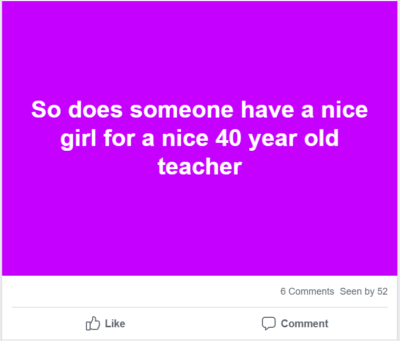Photo credit: athree23 | Pixabay.com.
This past summer, Ronit Treatman read a wedding announcement in the New York Times about a successful match made at a bar mitzvah. Treatman, a 50-year-old Philadelphia native, has spent the last decade connecting the Jewish community, largely through several community forums she has built and managed on Facebook. Reading the wedding announcement, she said, “I had a eureka moment and decided to try to bring this type of effort to the world of Facebook.” And so, “Jewish grandparents matchmaking for grandchildren,” a small but active Facebook group, was born.
Treatman is not alone in wanting to bring the art of matchmaking to the digital world. A search for the term “matchmaking” on Facebook yields many results. Users looking for a Jewish match can browse their options, from “Frum Jewish Singles Matchmaking” to “SHIDDUCHBOOK.” Some groups specify a denomination or an age range. Most state that their mission is to help Jews marry other Jews and start families.
The description for Treatman’s group declares itself a “virtual shtetl” and asks members to “help the younger generation connect and get married.” Treatman explained that “the ideal member is an energetic grandparent with a large social circle.” In one of her early posts, she called upon members to “Harness your yenta power” and “invite all the yentas you know (they don’t have to be grandparents) to join us.”
Treatman, who herself is not yet a grandmother, created the group in July, 2018. It now has over 100 members and what she calls “a small amount of activity.” Treatman said that the group has not yet produced a match, but that it is still very new.
The prevalence of online platforms intended to help Jews date and marry other Jews can perhaps be explained by the increased rate of interfaith marriages, which has stoked fears (especially on the right) that American Jews are assimilating and may disappear altogether. A Pew Survey from 2013 reported that “overall, the intermarriage rate is at 58 percent, up from 43 percent in 1990 and 17 percent in 1970.” The intermarriage rate among non-Orthodox Jews is even higher, at 71 percent.
For young, non-Orthodox Jews accustomed to making their own romantic choices, matchmaking may seem unnatural or arcane. Some younger Jews feel that the focus on heterosexual couples and biological children in matchmaking spaces excludes queer Jews, as well as those who are not able or interested in having biological children. Treatman said that her group is open to all matches. “There are many types of families. Same sex couples have children, and create beautiful Jewish families,” she said, adding, “It is wasteful to choose not to help gay Jews propagate our genes.”
Although Treatman uses biological terms to describe the importance of matchmaking and Jewish continuity, she says she doesn’t exclude those who aren’t in the gene-propagating business from her Facebook group. “I don’t ask people who reach out to me for help about their plans to have a family,” she said. “That is for them to discuss with their potential spouse.”
However, Treatman is open about the fact that her priority is to make Jewish matches that result in more Jewish children. While the continuation of the Jewish faith has long been a concern, there is conflicting data about whether interfaith marriages are causing Hebrew school attendance to dwindle. Oft-cited statistics from the the 2013 Pew Survey note that far fewer intermarried couples raise Jewish children than Jewish couples do, but the disparity may be less drastic than some suggest. For example, while Pew reports that 96 percent of Jewish couples raise their children “Jewish by religion” compared to only 20 percent of intermarried couples, an additional 41 percent of children in interfaith households are raised either partly Jewish or culturally Jewish.
The focus on married couples also means that many queer Jews who were barred from marriage in 2013, and other families with unmarried parents, are not included in the data. Nor do statistics always delve into the reasons why intermarried couples may not have access to Jewish spaces.

Outside of the maelstrom of debate around intermarriage and continuity, the “Jewish grandparents” group is a quiet, focused oasis. So far, many of the posts in the group have been articles giving dating advice, or ads for singles events. There have been a few posts, however, searching for matches. One member made a post in August in a large font against a purple background: “So does someone have a nice girl for a nice 40 year old teacher.” She noted in the comments that the 40-year-old teacher in question was her son, and that “he will travel” for a potential match. Another member responded that she had someone in mind, but it turned out that the theoretical love-birds were too far away for a set-up. The original poster made it clear that her matchmaking efforts, while well-intentioned, remained clandestine. “I can’t tell him I’m doing it,” she wrote.
The group also has a few younger members searching for love themselves. One woman, who we will call Lilah, joined the group in September after seeing a post about it on a local forum. Lilah is in her early 30s and is a member of several Jewish matchmaking Facebook groups. She said that none of them have been effective for her, in part because many of the groups have public settings and anyone can see her posts. Lilah is self-employed and worries how public posts with personal dating information would affect her job. “On Facebook, you get very little information and often thousands of people,” she said. “If you’re lucky, someone will message with you who is worth talking to.”
Lilah said that while she has connected online with several people through groups on Facebook, she has not met up with any of them in person. In general, she prefers other digital dating sites and apps like JSwipe and JCrush. Lilah, who self-identified as a “traditional” Jew, is committed to marrying a Jewish person. “It’s a lifestyle choice,” she said. “Being Jewish affects almost all of the decisions and choices I make. I need someone on the same page.”
Another member of the group, Aleeza Ben Shalom, is also committed to Jews marrying other Jews, and started a dating coach business to help people find good matches. “The Jewish people have valued the process of matchmaking for thousands of years,” she said. “Dating coaching to me is a modern form of matchmaking.”
Ben Shalom said she joins matchmaking groups on Facebook so she can stay in the know and offer advice. “I love the idea of Jewish grandparents doing matchmaking for their grandchildren,” she said. “One never knows where their match will come from. I expect to hear of a successful match soon from that group.”
Sarah Asch studies English literature and creative writing at Middlebury College, where she will graduate in February 2020. She serves as the editor at large of the Middlebury Campus and her past work has appeared in the San Francisco Public Press and Tikkun Magazine.

